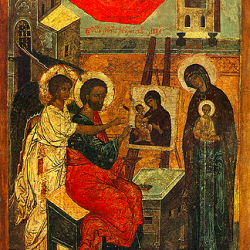There are a lot of really great thinkers, yet Kierkegaard is certainly one who critiques our façade of what Christianity is. He also communicates the idea that academic Christianity, theology, can be a way in which we insulate ourselves from the true gospel and protect ourselves from it. Those are things that we certainly begin to see in evangelicalism. As a kid from the Bible belt, I was kind of suffocated with Christianity. In a lot of ways, where everything is Christian, nothing is Christian. That's something that Kierkegaard was really pointing at. When our money says "In God We Trust," but our economy looks like the Seven Deadly Sins, then the character of God is challenged. That's the essence of using the Lord's name in vain, having the façade of Christianity without the heart of it.
And of course Gandhi and so many others pointed out the same contradictions. When Gandhi was asked about Christianity, he said, "I love Jesus; I just wish that Christians took him more seriously. They look so unlike their Christ." Those are great critics who can remind us what our faith is truly about.
Other inspirations include Jacques Ellul, who critiqued the technique or forms of our faith when they don't have love and justice at the heart of it. And Paulo Freire in Latin America and others who have done popular theology to change the way that we learn our faith.
I also find heroes in the black church in the United States. One of the signs that the Holy Spirit is at work in the world is that the black church has been able to survive the shameful things that white Christians have done in the name of God and justified with scripture. So I admire folks like John Perkins, an 80-year-old legend from the Civil Rights struggle who has been a mentor and teacher of mine.
You studied youth ministry in college. When you began down the path toward becoming a minister, did you have a sense that God would call you down the path He has? Or has this all been one adventure after another?
It's been one adventure after another. I love the scripture that says we work out our salvation "with fear and trembling." There's a sense of not really fully knowing what's next. When you look back on your life, it's easy to think, wow, that was in the works, and you see what seems like a pretty clear path to bring you to where you've come.
But a lot of it has been a gentle whisper, and a nudge here and there. Everything I have experienced and participated in has been with community -- like going to India, going to Iraq, living in Philly the last sixteen years. All of that has been in the context of other people doing life together.
Let's talk about "doing life together." We have a nuclear vision of Christian community, where the church is divided up into families, and the families come together now and then but otherwise live their lives apart, sealed off behind the four walls of their separate homes. Does this make it more difficult to recover something resembling the community of the early church?
Without a doubt there's some deep wisdom in the scripture that says that we're not to conform to the patterns of the world but be transformed by renewing our minds. We're to have a new way of thinking about things, including family. Jesus really challenges the notions and even the idol that we have made of the nuclear family, when he says, "Unless you hate your own father and mother, you're not ready to be my disciple." I know that Jesus is not shunning a love for our family. He loved his mother, and as he was dying on the cross he encouraged John to take care of her. But he's pushing the boundaries of where our love stops.
A lot of times a love for our own family or our own nation creates a shortsightedness. This is my people and my family. But Jesus says, actually, you're born again. That means that if someone is in prison, it's like your own kids are in prison. If someone's suffering injustice, it's like you're suffering. I really love the line, "A love for our own people is not a bad thing, but our love doesn't stop at any border."
We are born again into a terribly dysfunctional family. If we're going to take our rebirth seriously, it should keep us up at night. It should allow us to be disturbed by the pain and the suffering that is happening around the world and even right next to us.
Now there's a sense of having a new vision for family in scripture. One of the most obscure and sweet things is when Jesus is a kid and he gets lost for a few days. How does your kid get lost for a few days? Well, because they lived in community; they lived in a village. They're saying, "Oh, he's probably with Martha, or he's with Peter's mother." That's part of what we've lost in our rampant individualism.
The patterns of this world, when it comes to suburbia, are built around things that are very counter-cultural to the gospel. They're built around a vision of independence rather than inter-dependence. They're built around things like fear and security, and moving away from neighborhoods where there are people who don't look like us, or where there is higher crime. And yet the very call of Jesus is to move closer to suffering, not away from it.





